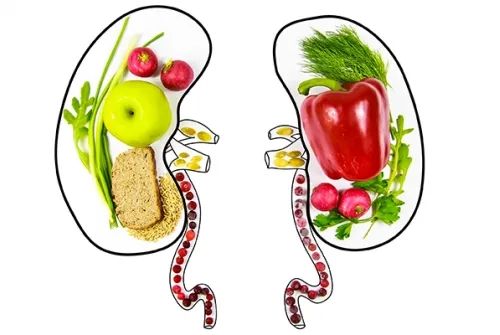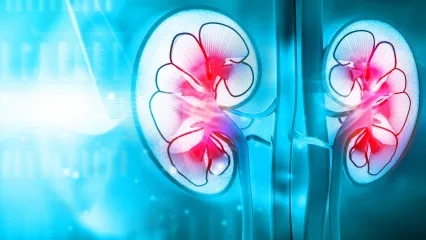Alo Yeditepe
Alo Yeditepe
Improper Nutrition Invites Kidney Failure
Internal Diseases and Nephrology Specialist Prof. Dr. Gülçin Kantarcı, who pointed out that kidney failure, which is a difficult symptom, is becoming increasingly common, stated that diabetes and hypertension, which also develop depending on the diet, cause kidney failure. Prof. Dr. Kantarcı stated, "We are the first in the world in the rate of increase in diabetes in our country. Many people are overweight at the obese level. Diabetes and hypertension invite kidney diseases. Before reaching the stage of kidney failure, the priority should be to protect kidney health in diabetic and hypertensive patients or people with a predisposition to kidney disease. It is necessary to consume fresh food, reduce salt consumption, and unnecessary vitamin consumption should be ceased."
Noting that kidney failure is seen in 1 out of every 10 people in the world and 1 out of every 7 people in Turkey, Yeditepe University Kosuyolu Hospital Internal Medicine and Nephrology Specialist Prof. Dr. Gülçin Kantarcı stated that increasing obesity and diseases such as diabetes and hypertension are causing kidney failure. Prof. Dr. Kantarcı, who made nutritional recommendations to patients before and after dialysis, underlined the need to be sensitive about kidney failure.
It will Become the 5th Cause of Loss of Life in the World
Pointing out that kidney failure is a very common health problem in the world and Turkey, Prof. Dr. Kantarcı stated, "1 out of every 10 people in the world and one out of every 7 people in our country has kidney failure. Some statistics even show that by mid-2020, kidney failure will be the 5th cause of loss of life in the world. Despite being such a serious disease, our awareness is very low. The most important factor in this is that it gives late symptoms, symptoms appear when the disease reaches an advanced stage. If the patient goes to the hospital due to a different complaint or disease, kidney failures diagnosed by chance at an earlier stage."
Prof. Dr. Gülçin Kantarcı gave the following information about the complaints caused by the disease "Generally, shortness of breath, decreased urination, change in urine color, foaming urine, weakness, fatigue, bad breath odor, cramps in the legs and hands are the symptoms before the diagnosis. However, when these complaints occur, the disease has reached an advanced stage. Even with these findings, patients do not think they have this disease."
Underlining that it is a difficult disease to diagnose without laboratory tests, Prof. Dr. Gülçin Kantarcı stated, "For this reason, especially those with chronic diseases such as high blood pressure, diabetes, and people with kidney disease in their family are at risk group. People who play sports and do not consume enough fluids, and people who use painkillers intensively for reasons such as rheumatic diseases or headaches should definitely be examined for kidney disease. With an early diagnosis in these people, we can slow down the process leading to dialysis and organ kidney transplantation. We can follow the patients for a longer period with a better quality of life."
Diabetes and Hypertension Invites Kidney Failure
Reminding that Turkey ranks first in the world in the rate of increase in diabetes, Prof. Dr. Kantarcı pointed out the close relationship between chronic kidney disease, obesity, and diabetes. Prof. Dr. Kantarcı stated, "We are gaining weight as a society. Many people on the street are overweight at the obese level. This increase in obesity not only invites diabetes, especially Type 2 diabetes, but also causes hypertension. As a result, diabetes and hypertension invite kidney disease. More than one-third of our dialysis patients are diabetic patients. A significant portion of them are patients with high blood pressure. Therefore, with the early diagnosis and treatment of these two diseases, kidney failure that reaches dialysis can be prevented."
Explaining the measures that can be taken to prevent obesity, Prof. Dr. Gülçin Kantarcı continued her words as follows "In order not to be obese, we should be able to expend as many calories as we consume. Along with exercise, we should eat the right diet, avoid ready-to-eat food consumption, and switch to a diet based more on fresh fruits, vegetables, and fresh meat. In addition, controlling the consumption of carbohydrates, floury foods, limiting salt consumption, and drinking enough water is very important both in terms of weight control and protecting the kidneys."
Diet Changes Before and After the Dialysis
Pointing out that nutrition is of particular importance for patients who develop renal failure, Prof. Dr. Gülçin Kantarcı stated that nutrition before dialysis and nutrition in patients requiring dialysis are different from each other and that the most important point in this difference is salt. Prof. Dr. Kantarcı said, "While we restrict protein before dialysis, we give as much protein as possible after dialysis. Patients should have a balanced diet consisting of proteins, fats, and carbohydrates in order to prevent muscle, energy, fat loss, and loss of appetite."
Stop Unnecessary Vitamin Consumption
Prof. Dr. Gülçin Kantarcı stated that "Vitamins are very popular in pre-dialysis and patients requiring dialysis, and even in society recently." She also added, "People should avoid the vitamins they consume in order to avoid viral diseases. For example, vitamin C. High doses of vitamin C in pre-dialysis people increase oxalate. This causes kidney stone formation in healthy people. It can also cause calcification in soft tissues and damage vessel walls in post-dialysis patients. Therefore, high doses of vitamin C should be avoided. The idea of "let’s take vitamins, there is no harm in this" should be abandoned. It should not be taken unless the physician recommends it."
Giving information about other vitamins used by kidney patients, Yeditepe University Hospitals Internal Medicine and Nephrology Specialist Prof. Dr. Gülçin Kantarcı pointed out the common misconceptions on the subject:
"Vitamins A, D, K, and E, which are fat-soluble vitamins, can sometimes be used uncontrolled and in high doses in dialysis diseases. The same mistake can be made in the pre-dialysis period. Especially recently, everybody consumes vitamin D. However, one should not consume vitamin D without knowing their level of vitamin D. Because vitamin D accumulates in the human body, and when it is too much, it becomes toxic. Therefore, vitamin D should be consumed by tracking its level in the body. Vitamin K also has different forms. While certain forms are beneficial, certain forms can be harmful. Therefore, it should not be used uncontrolled. B vitamins lost in dialysis machines should also be consumed when needed. When consumed beyond the need, unnecessary consumption can have harmful effects on soft tissues."
Press Coverage: star.com | hurriyet.com | aksam.com | sabah.com | akittv.com | haber7.com | gazetevatan.com | posta.com | takvim.com
About
Faculty and Year of Graduation:
Uludag University Faculty of Medicine 1984-1990
”
See Also
- What is Hypoglycemia?
- Common Misconceptions About Kidney Transplantation
- Kidney Diseases and Treatment Methods
- 10 Questions About Kidney Transplantation
- How Should the Daily Salt Consumption Amount Be?
- Misconceptions About Hypertension
- Chronic Kidney Disease and Treatment Methods
- What is Hypertension?
- Things Wondered About Kidney Transplantation and Organ Donation
- If You Consume More Than 5 grams of Salt...
- The Frequency of Hepatitis Seen in Dialysis Patients Is Decreasing
- 12-Year-Old Tuğba Nur Survived with Transplant
- Excess Protein Does Not Increase Muscle Mass, and It Impairs the Kidneys
- AV FISTULA Should Be Done At The Right Time For Hemodialysis Patients
- Pay Attention to Kidneys in Pregnancy!
- He Held On To Life with His Brother's Kidney
- Recommendations to Strengthen the Immune System
- Kidney Failure Caused by Ear Obstruction
- There is Still a Lot of Misconception About Organ Donation
- He Lost 20 Kilograms in 40 Days for His Wife
- One Out of Every Seven People Has Kidney Disease
- How Should Kidney Patients Be Protected From COVID-19 Coronavirus?
- What is Propolis? How to Use Propolis?
- Important Warning from the Expert: “Not Adding Salt to Meals Alone Is Not Enough”
- Tissue Harmony Is Also Important for Success in Kidney Transplant
- Phytotherapy and Immune System
- Hereditary Kidney Diseases Are Underrecognized!
Alo Yeditepe







